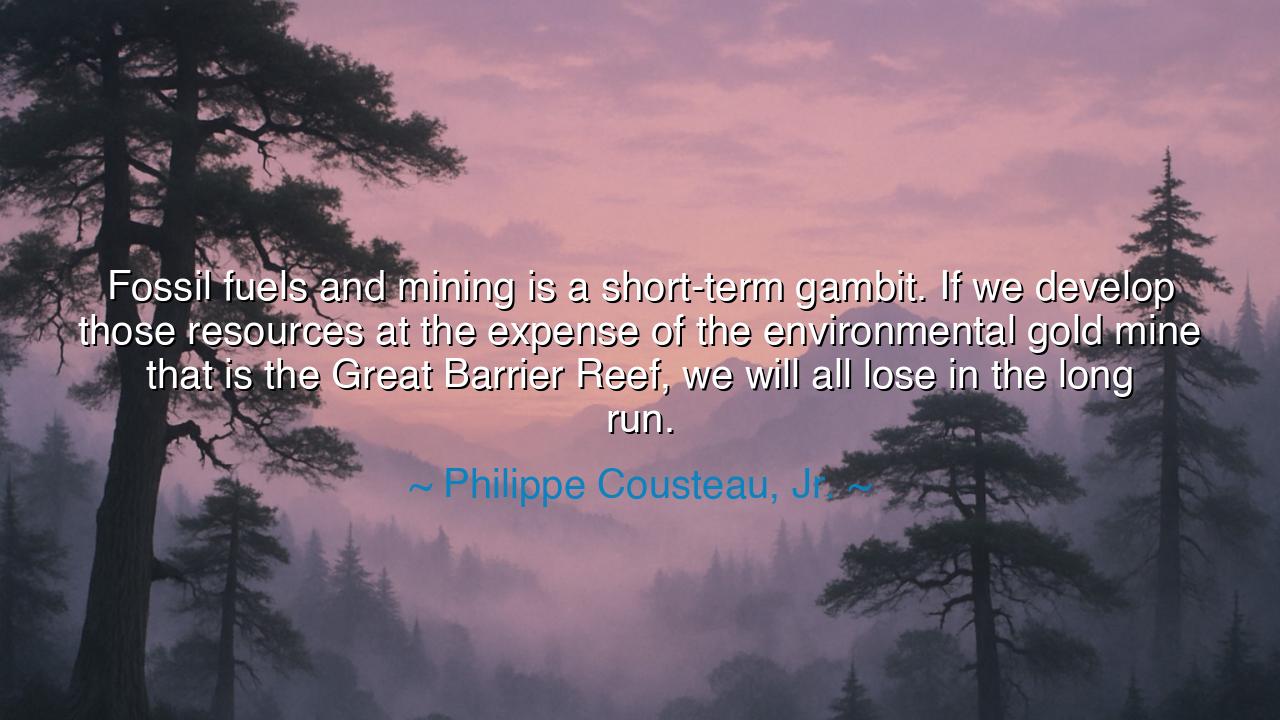
Fossil fuels and mining is a short-term gambit. If we develop
Fossil fuels and mining is a short-term gambit. If we develop those resources at the expense of the environmental gold mine that is the Great Barrier Reef, we will all lose in the long run.






Hear the words of Philippe Cousteau, Jr., descendant of ocean voyagers and bearer of his family’s torch of wisdom: “Fossil fuels and mining is a short-term gambit. If we develop those resources at the expense of the environmental gold mine that is the Great Barrier Reef, we will all lose in the long run.” In this cry lies the essence of stewardship, the recognition that wealth extracted from the earth may glitter for a moment, yet true treasure lies in the living wonders of nature, treasures that once destroyed cannot be remade by human hands.
At the heart of his saying is the contrast between short-term gambit and long-term loss. Fossil fuels and mining promise quick gain: energy for today, profit for shareholders, growth for nations. Yet these are fleeting victories, bought at the cost of enduring harm. The Great Barrier Reef, by contrast, is an environmental gold mine, not measured in barrels of oil or heaps of coal, but in its biodiversity, its protection of coastlines, its sustenance of fisheries, and its wonder that inspires human spirit. Cousteau reminds us that destroying such wealth to chase temporary profit is not only foolish but suicidal.
History provides testimony to this truth. Consider the collapse of Easter Island, where ancient peoples, seeking short-term resources, cut down their forests until none remained. Their society, once thriving, collapsed into scarcity and strife. They won temporary gains in wood and soil, but in the long run, they lost their very way of life. So too, Cousteau warns, will we collapse if we sacrifice ecosystems of immeasurable value for the fleeting hunger of fossil fuel extraction.
The Great Barrier Reef itself stands as both wonder and warning. It is the largest living structure on Earth, visible even from space, home to thousands of species. Yet it has already been scarred by warming seas, coral bleaching, and pollution. To add the devastation of mining and fossil fuel expansion would be to push it beyond the point of recovery. Once gone, no technology can rebuild a reef that took millennia to form. The reef is more than beauty; it is a bulwark of life, an inheritance for humanity, and its loss would be a wound to the entire planet.
The wisdom in Cousteau’s words is also spiritual. He speaks of gold, a metal men have killed and died for, but redefines it in terms of nature. The true gold mine is not in the bowels of the earth, where coal and ore lie hidden, but in the living systems above it: the oceans, forests, rivers, and skies that give us breath, food, and meaning. To dig for false gold while destroying the real is to blind ourselves with greed, forgetting that no amount of money can buy a stable climate, clean water, or a flourishing ecosystem.
The lesson for us is clear: seek not only the profit of today but the survival of tomorrow. Nations must resist the temptation to plunder their treasures for short-term wealth. Citizens must demand leaders who value the long run, who defend reefs, forests, and rivers as the true legacy of humanity. And each of us must live in ways that reduce the demand for fossil fuels, that honor renewable energy, and that place conservation above consumption.
Therefore, children of tomorrow, take Philippe Cousteau’s words as both warning and guide. Do not gamble with the future. Do not trade living wonders for dead fuel. Guard the Great Barrier Reef and all that it symbolizes: the majesty of creation, the abundance of life, the wealth that endures across generations. For if we choose wisely, we preserve not only beauty but survival. But if we choose poorly, we inherit ash where once there was living gold. Choose well, and you shall pass on a world worthy of its heirs.






AAdministratorAdministrator
Welcome, honored guests. Please leave a comment, we will respond soon